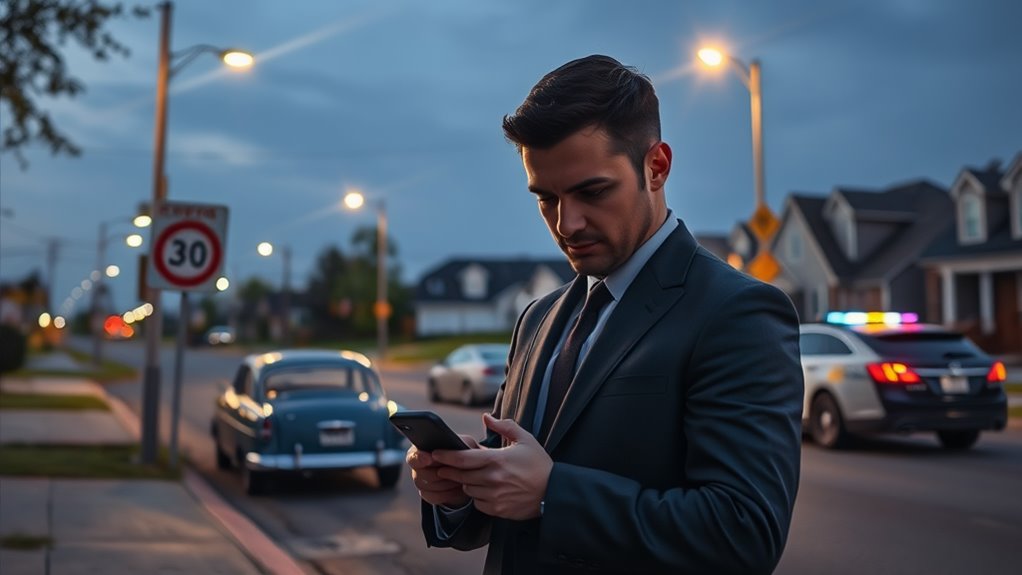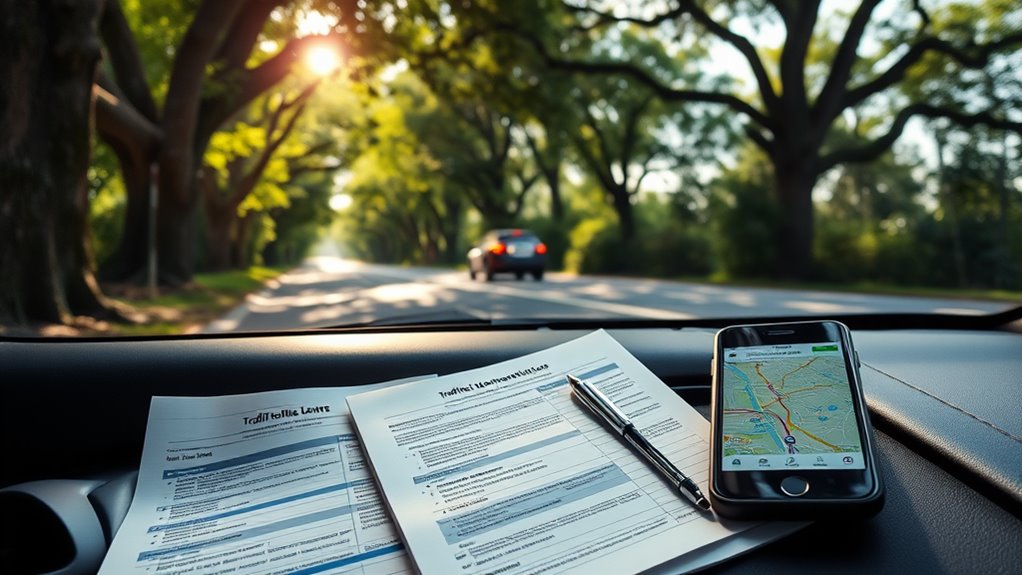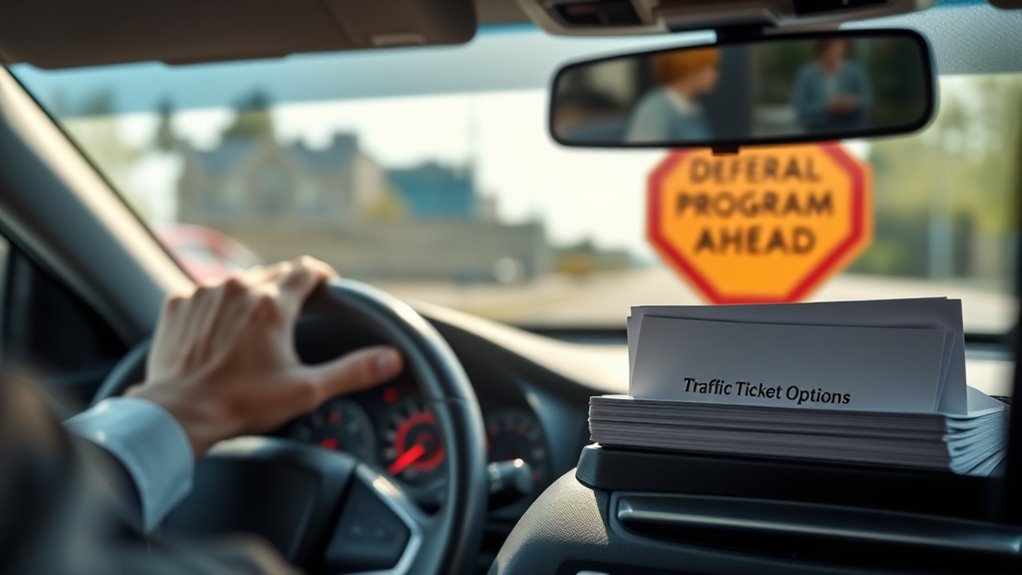
Have you ever wondered if you could legally reduce a traffic ticket without the stress of court? Whether it's a minor infraction or a more serious violation, there are strategic steps you can take to navigate the complexities of traffic law. From gathering evidence to negotiating with prosecutors, the right approach can make all the difference. Discover how to effectively tackle your ticket and potentially keep it off your record.
Key Takeaways
- Gather evidence to challenge the ticket, focusing on errors in details or missing information that could lead to dismissal.
- Highlight mitigating circumstances, such as a clean driving record or urgency, to strengthen your case.
- Negotiate plea deals respectfully with prosecutors, presenting documentation and mitigating factors to support your position.
- Explore deferral programs to keep the infraction off your record, which can help avoid increased insurance premiums.
- Consider seeking legal counsel to navigate the process effectively and identify potential errors on your ticket.
Gather Evidence to Challenge the Ticket

When you receive a traffic ticket, it's crucial to gather evidence that can help you challenge it effectively. Start by reviewing the ticket details carefully for any errors in location, speed, or vehicle description. Identify the violation code, as understanding it will guide your defense strategy.
Pay attention to the time and place of the alleged offense, and look for missing information that might warrant dismissal. Additionally, consider disputing the officer's judgment by providing evidence that conditions made your actions safe. It's also advisable to consult with a traffic attorney who can offer specialized guidance on navigating the legal process.
Utilize visual evidence, like photographs of the scene, videos, and diagrams to illustrate your case. Collect eyewitness accounts and document all testimonies.
Finally, request the state's evidence and scrutinize officer notes for inconsistencies. By thoroughly analyzing this information, you can effectively position yourself to contest the ticket and potentially reduce penalties.
Focus on Mitigating Circumstances
Mitigating circumstances can play an essential role in shaping the outcome of your traffic ticket case, as they provide context that might lead to reduced penalties.
When presenting your case, clearly explain the circumstances surrounding the incident. For instance, if you were rushing to a hospital, that urgency can greatly influence the judge's decision. A clean driving record also works in your favor, demonstrating responsible behavior.
Gather supporting evidence such as witness statements, photographic proof, or documents proving a medical emergency. Consulting an attorney knowledgeable in mitigation strategies can further enhance your chances of a favorable outcome.
Negotiate Plea Deals With Prosecutors
Negotiating plea deals with prosecutors can greatly alter the outcome of your traffic ticket case, especially if you approach the process with preparation and a clear understanding of your rights.
Approaching plea negotiations with preparation and knowledge of your rights can significantly impact your traffic ticket outcome.
Here are some effective strategies to take into account:
- Research Your Violation: Know the fines and penalties associated with your ticket.
- Gather Evidence: Compile any documentation that can support your case and strengthen your position.
- Maintain Respectful Communication: A courteous demeanor can positively influence your negotiations.
Explore Deferral Programs for Ticket Management

Deferral programs offer a valuable opportunity for drivers seeking to manage their traffic tickets effectively, especially if you're looking to prevent points from accumulating on your driving record.
To qualify, you typically need a clean driving history without moving violations in the past year and a spotless criminal record. Be mindful that if you hold a commercial license, you may not be eligible.
While deferral fees range from $100 to $300, they can save you from higher insurance premiums. Programs usually last 6 to 12 months, requiring you to maintain a valid license and not incur new citations.
Completing a deferral successfully keeps the infraction off your record, providing long-term financial benefits.
Contest Subjective Officer Judgments
When you receive a traffic ticket based on an officer's subjective judgment, it's crucial to understand that contesting it can be a viable option.
Here are some strategies to reflect on:
- Prove your speed was safe under basic speed laws, taking into account conditions at the time.
- Challenge the officer's location and focus, highlighting any distractions or limited visibility.
- Gather evidence, such as witness statements or diagrams, to support your version of events.
Argue Mistakes of Fact for Dismissal
Arguing mistakes of fact can be a powerful strategy for dismissing a traffic ticket, especially when you genuinely believe you were following the law under the circumstances.
To build a solid defense, gather clear documentation, like photos of unclear or vandalized signs. If a witness can corroborate your account, their testimony can greatly strengthen your case.
You might also highlight any recent changes in traffic rules that you weren't aware of. Remember, judges are more likely to dismiss tickets when presented with compelling evidence and a respectful demeanor.
Focus on demonstrating that your mistake was honest and reasonable, as this can differentiate your case from neglectful driving behaviors.
Seek Legal Counsel for Effective Negotiation

While traversing the complexities of traffic violations, seeking legal counsel can greatly enhance your chances of a favorable outcome. A skilled traffic lawyer brings valuable negotiation expertise to the table, guaranteeing you don't face unnecessary fines or penalties.
Here's how legal representation can help:
- Negotiation Expertise: Lawyers can reduce fines or propose alternative penalties like defensive driving courses.
- Knowledge of Legal Technicalities: They identify errors on your ticket that may lead to dismissal.
- Protection of Driving Record: By negotiating effectively, they help prevent long-term consequences on your driving record.
Don't risk higher fines and severe penalties by going it alone. Engaging a lawyer guarantees you navigate the legal system effectively, maximizing your chances for a positive resolution.
Conclusion
In the grand theater of traffic law, you're not just an actor; you're the star! With these savvy strategies, you can turn the tide on those pesky tickets and keep your record pristine. Whether you're gathering evidence like a detective or charming prosecutors with your negotiation skills, remember: you've got the power to rewrite your traffic story. So, don't just sit there; take action, and watch as those tickets vanish like magic!


